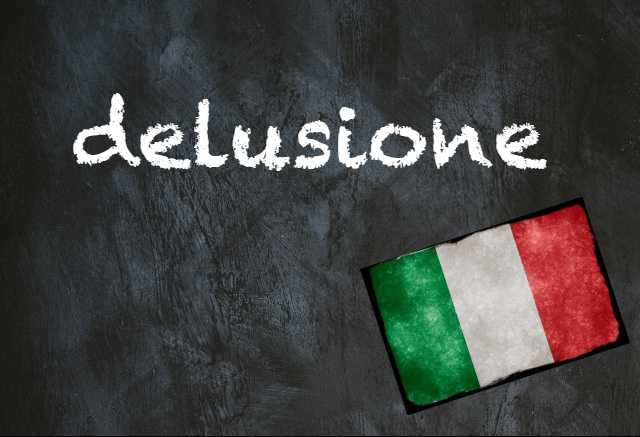Italian word of the day: 'Delusione'

We hope this word doesn't disappoint.
Experiencing a delusione (hear the pronunciation here) in Italian may not be pleasant, but it doesn't mean you need escorting to the psychiatrist's chair.
That's because while delusione may look and sound like its English cousin 'delusion', the word actually means something slightly different: disappointment.
The two nouns have the same root in the Latin dēlūsiō, meaning deceiving or deluding, and delūdō, meaning to deceive, dupe, or mock.
But while the English 'delusion' has hewn close to the original Latin meaning over the centuries, delusione at some point branched off to its current, quite different, definition.
There's not much in the way of information about exactly when and how that happened, but it's clearly a short associative hop from feeling 'deceived' or 'duped' by things turning out differently to what you'd expected to feeling 'disappointed'.
Che delusione.
How disappointing.
La festa era, purtroppo, una grande delusione.
The party unfortunately was a big disappointment.

The adjective for 'disappointed' is deluso for a single masculine subject, changing to delusa/delusi/deluse if the subject being described is feminine singular/masculine plural/feminine plural.
Era delusa da come era venuta la torta.
She was disappointed with how the cake turned out.
Devo dire che siamo davvero delusi dal fatto che siamo stati trattati in questo modo.
I have to say that we're very disappointed to have been treated this way.
A word you'll often see used in combination with deluso/a/i/e is rimanere (ree-man-EH-reh): rimanere deluso.
You might correctly recognise rimanere as meaning 'to remain', and wonder why we'd use that word here - but rimanere also has an alternative meaning along the lines of 'to become', 'to get', or simply 'to be'.
For example, you can rimanere incinta (get pregnant), or rimanere ferito (get hurt or wounded, for example in a car accident).
It's also very often used with emotions, usually those experienced in the moment rather than long-term ones: you can rimanere sorpreso (be surprised), rimanere triste (be sad), rimanere scioccato (be shocked)... and rimanere deluso (be disappointed).
Sono rimasto molto deluso quando mi ha detto di aver abbandonato la scuola.
I was very disappointed when she told me she had dropped out of school.
Siamo rimasti delusi dalle condizioni della stanza d'albergo al nostro arrivo.
We were disappointed by the condition of the hotel room when we arrived.
With that, we wish you a weekend free of delusioni (disappointments)!
Do you have an Italian word you’d like us to feature? If so, please email us with your suggestion.
Comments
See Also
Experiencing a delusione (hear the pronunciation here) in Italian may not be pleasant, but it doesn't mean you need escorting to the psychiatrist's chair.
That's because while delusione may look and sound like its English cousin 'delusion', the word actually means something slightly different: disappointment.
The two nouns have the same root in the Latin dēlūsiō, meaning deceiving or deluding, and delūdō, meaning to deceive, dupe, or mock.
But while the English 'delusion' has hewn close to the original Latin meaning over the centuries, delusione at some point branched off to its current, quite different, definition.
There's not much in the way of information about exactly when and how that happened, but it's clearly a short associative hop from feeling 'deceived' or 'duped' by things turning out differently to what you'd expected to feeling 'disappointed'.
Che delusione.
How disappointing.
La festa era, purtroppo, una grande delusione.
The party unfortunately was a big disappointment.

The adjective for 'disappointed' is deluso for a single masculine subject, changing to delusa/delusi/deluse if the subject being described is feminine singular/masculine plural/feminine plural.
Era delusa da come era venuta la torta.
She was disappointed with how the cake turned out.
Devo dire che siamo davvero delusi dal fatto che siamo stati trattati in questo modo.
I have to say that we're very disappointed to have been treated this way.
A word you'll often see used in combination with deluso/a/i/e is rimanere (ree-man-EH-reh): rimanere deluso.
You might correctly recognise rimanere as meaning 'to remain', and wonder why we'd use that word here - but rimanere also has an alternative meaning along the lines of 'to become', 'to get', or simply 'to be'.
For example, you can rimanere incinta (get pregnant), or rimanere ferito (get hurt or wounded, for example in a car accident).
It's also very often used with emotions, usually those experienced in the moment rather than long-term ones: you can rimanere sorpreso (be surprised), rimanere triste (be sad), rimanere scioccato (be shocked)... and rimanere deluso (be disappointed).
Sono rimasto molto deluso quando mi ha detto di aver abbandonato la scuola.
I was very disappointed when she told me she had dropped out of school.
Siamo rimasti delusi dalle condizioni della stanza d'albergo al nostro arrivo.
We were disappointed by the condition of the hotel room when we arrived.
With that, we wish you a weekend free of delusioni (disappointments)!
Do you have an Italian word you’d like us to feature? If so, please email us with your suggestion.

Join the conversation in our comments section below. Share your own views and experience and if you have a question or suggestion for our journalists then email us at [email protected].
Please keep comments civil, constructive and on topic – and make sure to read our terms of use before getting involved.
Please log in here to leave a comment.